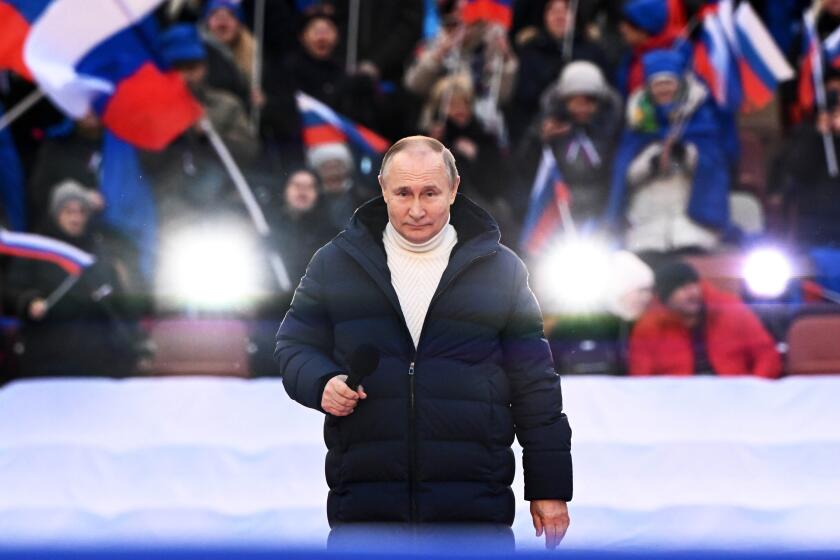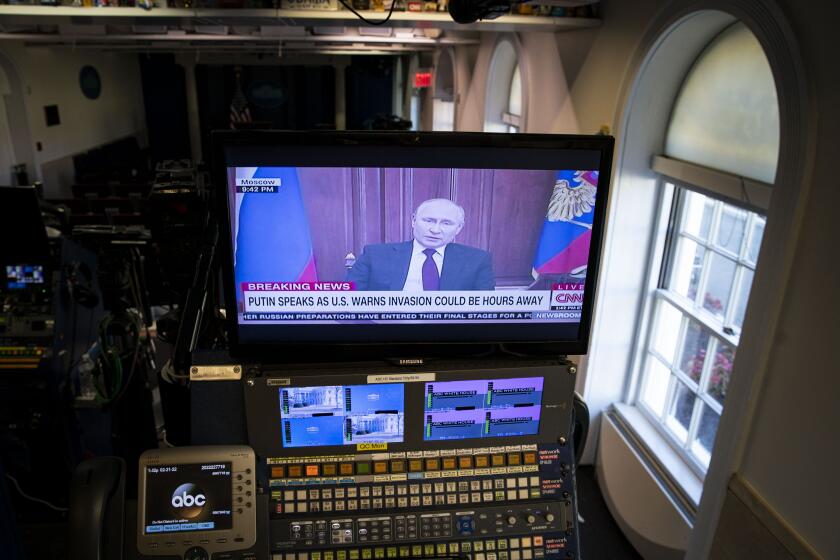A Russian empire ‘from Dublin to Vladivostok’? The roots of Putin’s ultranationalism
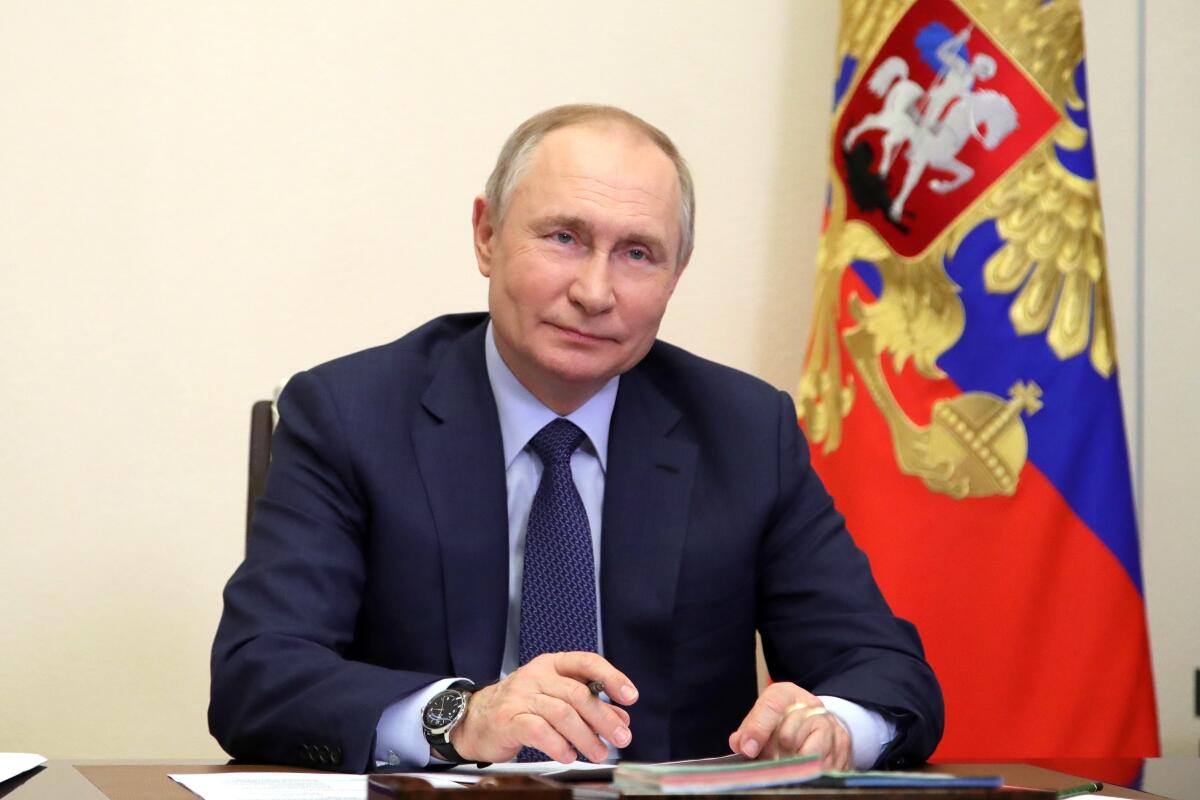
- Share via
LONDON — Russian President Vladimir Putin’s ambitions and his ruthless style of achieving them in his invasion of Ukraine can be traced at least in part to a handful of conservative Russian thinkers who, like him, came to prominence in a post-Soviet nation struggling to find its identity, and who have helped mold his ideology.
“You cannot get inside Putin’s head at this very moment,” said Marlene Laruelle, a historian of Russia and political scientist at George Washington University. But “there is a history of advisors, formal and informal, and thinking that has surrounded him over the years that you can look at to understand his perspective.”
U.S. officials scrambled to make clear that despite President Biden’s off-the-cuff condemnation of Russian President Vladimir Putin, regime change in Moscow is not on Washington’s agenda.
In justifying the war he launched in late February by blaming a decadent West for attempting to chip away at Russian identity, borders and security, Putin echoed key ideas of Eurasianism, a 20th-century political theory that modern-day followers describe as saying Russia is neither part of Europe nor Asia and is the enemy of the U.S.-led “Atlantic” world.
Long an “imperial people,” Russians can lead a “world empire,” according to writings of one of the most prominent proponents of Eurasianism, Alexander Dugin, 60, whom some refer to as Putin’s “Rasputin.”
Dugin, a former professor at Moscow State University, is not known to regularly meet or speak with Putin or his inner circle, though he has given high praise of the Russian leader. Many of his far-right, antisemitic writings are too extreme for even the Kremlin to publicly embrace. But when he failed to make significant formal political inroads after the Soviet Union’s fall, Dugin successfully set his eyes on gaining influence among policymakers, the military and Russian intelligence, all of whom have Putin’s ear.
His ideas, developed over dozens of books and prolific appearances in the Russian and Western media, appear to match Putin’s current frame of mind as the Russian leader continues his onslaught on neighboring Ukraine, leaving cities in rubble, thousands of civilians dead and millions fleeing, even as his ground forces remain stalled.
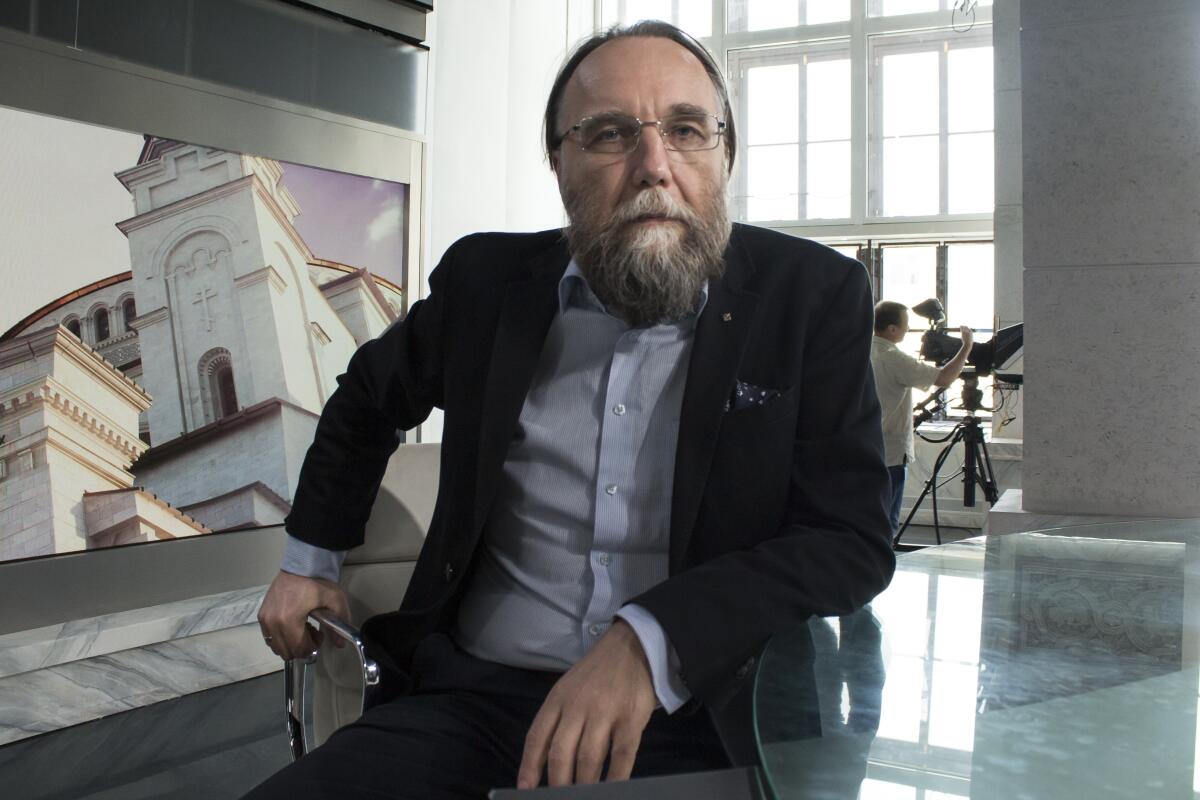
The writer’s 1997 treatise, “The Foundations of Geopolitics: The Geopolitical Future of Russia,” at times reads like an overview of recent Russian history as expressed by Putin today. Ukraine, it says, is “a state that has no geopolitical meaning, no particular cultural import or universal significance, no geographic uniqueness, no ethnic exclusiveness.” It represents an “enormous danger for all of Eurasia and, without resolving the Ukrainian problem, it is in general senseless to speak about continental politics.”
Such notions have also been echoed of late by voices of the American far right.
Ukraine “is kind of a concept. It’s not even a country,” said former Trump advisor Stephen K. Bannon on Feb. 24, the day Putin launched his invasion. He spoke about it on his podcast, “Bannon’s War Room.” In 2018, Dugin and Bannon met in Rome, and were reported to have spent several hours together.
Dugin, whose book has become common reading in the Russian military, has advocated a new Russian empire “from Dublin to Vladivostok.”
He sees technology as promoting a false sense of individualism and he has dismissed many modern-day European governments as extensions of America that encroach on Russia.
Putin struck similar chords in his pre-war speech last month when he said the U.S. was waging a proxy war on Russian freedom that had crossed the “red line.” The Ukrainian government was illegitimate, stocked with neo-Nazis and was oppressing Russians, Putin said, in the name of an American “empire of lies.”
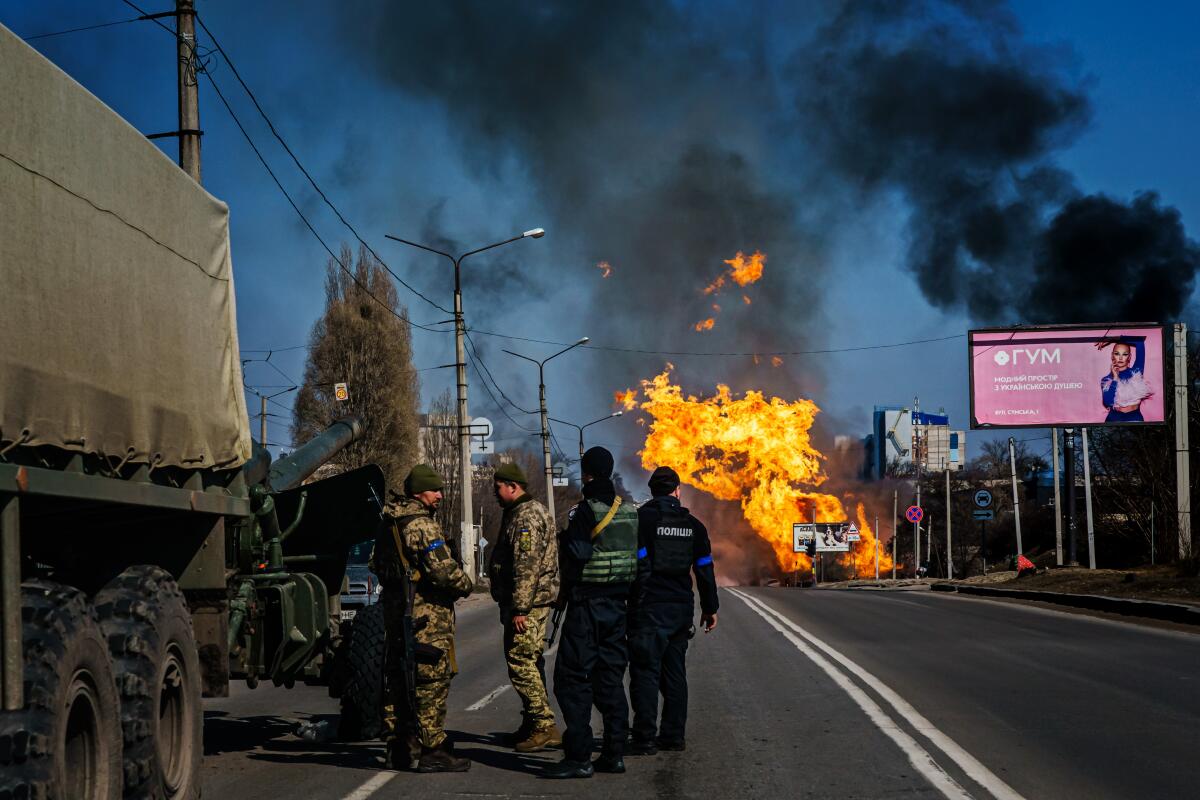
Benjamin Young, a professor at Virginia Commonwealth University’s Wilder School of Government and Public Affairs, describes Dugin as a man whose “radical ideas permeate the intellectual ecosystem of Russian conservatism. His predictions have also been frighteningly correct about the posture of post-Cold War Russia.”
“From Putin’s militant opposition to ‘globalism’ to the invasion of Ukraine, his theories align with much of the Kremlin’s actions.”
Like Putin, Young said, Dugin “wants a return to a more conservative and religious world order that fuses the Orthodox Church and state. He wants Eastern Europe to return to the Moscow-led Orthodox Church.”
Putin has enlisted Patriarch Kirill, the head of the Russian Orthodox Church, in the war effort, with Kirill recently praising the president and calling military service in the war a “manifestation of evangelical love for neighbors.”
Dugin, who in a 2008 interview with The Times said friendly U.S. relations with former Soviet states were a declaration of “psychological, geopolitical, economic and open war,” is not the only man whose ideas circulate among Putin and his circle.
Laruelle of George Washington University describes the Russian president as a person without “one single ideological source.”
Moscow’s war machine includes a popular TV talk show whose host, Dmitry Kiselyov, takes on anyone who contradicts Russian President Vladimir Putin.
“There are multiple people all of whom are mediated by the circle around Putin,” she said, “that united together to support this disastrous invasion.”
Putin himself last year named three influences during an address to the Valdai Club, a prominent Moscow think tank, Laruelle noted. They were Nikolai Berdyaev, a well-known Russian religious philosopher; Lev Gumilev, an eccentric Soviet-era ethnologist; and Ivan Ilyin, a 20th-century émigré who was a fan of Benito Mussolini and Adolf Hitler.
Putin has been reported to assign homework to regional governors to read the works of Gumilev and Ilyin. He has been relatively mum on Berdyaev, who like others has lauded Russia as having a unique role in history.
The Russian leader has cited Gumilev’s theory of “passionarity,” which Laruelle described as “a living force specific to each people group made up of bio-cosmic energy and inner force.” Speaking a little over a year ago, Putin said he “believe[s] in passionarity. … Russia has not reached its peak. We are on the march, on the march of development. … We have an infinite genetic code. It is based on the mixing of blood.”
Ilyin has also figured prominently in Putin’s background. In 2006, Michigan State University, which held Ilyin’s papers and manuscripts, said it would return them to Russia via one of Putin’s personal representatives.
“Putin’s speeches are inspired by Ilyin’s idea of Ukraine construction by opponents of Russia,” Laruelle said.
In his writings, Ilyin described Russia as a “living organism” of “nature and the soul” that “cannot be divided, only dissected.” His references to Ukraine were always in quotation marks because it was seen as part of the Russian “organism.”
More to Read
Sign up for Essential California
The most important California stories and recommendations in your inbox every morning.
You may occasionally receive promotional content from the Los Angeles Times.

